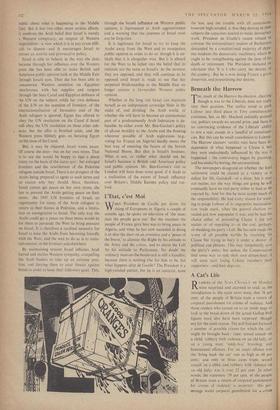The Activist
MR. BEN-GURION'S Visit to America to re- ceive a degree at Brandeis University, even though there was a war scare in the Middle East, has been hailed as a striking indication of Israel's peacefulness and of her disdain for Arab aggression. To those, however, who felt that the recent war scare was largely the creation of Israel the nonchalance was less impressive. The incident, indeed, has been an alarming illustration of the extent to which Israeli propaganda has captured almost all the British and American press. Israel's attack on the Syrian village of Tawafiq, for example, was represented in the West as a necessary defensive measure; in fact it was a piece of naked aggression. But when the UN Commission found that Israel had been a flagrant aggressor, the majority of the British daily papers did not even mention it. It is easy enough to imagine the headlines if the UN Com- mission had adjudged the UAR to be the aggressor.
The subservience of the British and New York press to Israel would be grave enough if its only effect was to mislead the British and American aublic about what is happening in the 'Middle east. But it has two other more serious effects. A confirms the Arab belief that Israel is merely I Western conspiracy, an outpost of Western imperialism--a view which it is in any event diffi- cult to dispute—and it encourages Israel to pursue an activist and provocative policy.
Israel is able to behave in the way she does because through her influence over the Western press she has been able to make British and American public opinion look at the Middle East Itrough Israeli eyes. Thus she has been able to :oncentrate Western attention on Egyptian ilterference with her supplies and cargoes through the Suez Canal and Egyptian defiance of the UN on the subject, while her own defiance Of the UN on the question of frontiers, of the internationalisation of Jerusalem and of the Arab refugees is ignored. Egypt has offered to obey the UN resolution on the Canal if Israel will obey the UN resolution on these other sub- jects; but the offer is brushed aside, and the Western press blithely goes on berating Egypt on the issue of the Canal.
But, it may be objected, Israel wants peace. Of course she does—but on her own terms. That is to say she would be happy to sign a peace treaty on the basis of the status quo: her enlarged frontiers and the resettlement of the Palestine refugees outside Israel. There is no prospect of the Arabs -being prepared to agree to such terms and no reason why they should. Since, therefore. Israel cannot get peace on her own terms, she has to prevent the Arabs getting peace on their terms: the 1947 UN frontiers of Israel, an opportunity for many of the Arab refugees' to return to their homes in Palestine, and a limita- tion on immigration to Israel. The only way the Arabs could get a peace on these terms would be for them to persuade the West to bring pressure on Israel.. It is therefore a cardinal necessity for Israel to keep the Arabs from becoming friendly with the West. and the way to do so is to main- tain tension an the frontiers and elsewhere.
By maintaining tension Israel inflames Arab hatred and excites Western sympathy, compelling the Arab leaders to take up an extreme posi- tion. and forcing them to utter threats against Israel in order to keep their followers quiet. This,
through the Israeli influence on Western public opinion, is t4epresented as Arab aggressiveness and a warning that the interests of 'Israel must not, be forgotten.
It is legitimate for Israel to try to keep the Arabs away from the West and to manipulate public opinion in order to do so. though it is un- likely that it is altogether wise. But it is absurd for the West to be lulled into the belief that its interests are the same as • Israel's. At the moment they are opposed, and they will continue to be opposed until Israel is made to see that her perpetual brinkmanship in the Middle East no longer assures a favourable Western public opinion.
Whether in the long run Israel can maintain herself as an independent sovereign State in the midst of, and dividing the Arab world, or whether she will have to become an autonomous part of a predominantly Arab federation is de- batable. In either event Mr. Ben-Gurion's policy of all-out hostility to the Arabs and the flouting. wherever possible of Arab aspirations (e.g., voting for France on Algeria) hardly seems the best way of ensuring the future of the Jewish National Home. But that is Israel's business. What is not, or rather what should not be, Israel's business is British and American policy and public opinion. Mr. Ben-Gurion's visit to London will have done some good, if it leads to a realisation of the extent of Israeli influence over Britain's Middle Eastern policy and out- look.



















































 Previous page
Previous page